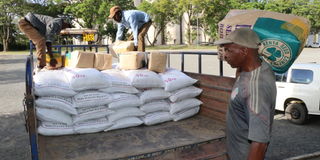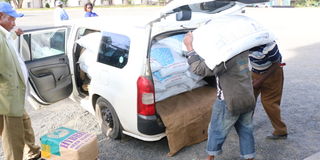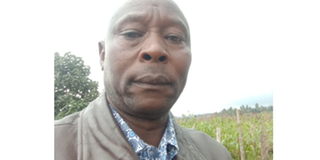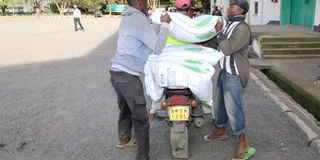This is what farmers in Nakuru are worried about as the distribution of subsidised fertiliser begins

In 2024, many farmers were disappointed after receiving substandard fertiliser that promised to boost crop yields but instead caused devastating losses.
The government's subsidised fertiliser, which was meant to ease the financial burden on farmers, ended up being a major setback for many, including farmer Isaac Kogo, who suffered significant losses and is now struggling with debt.
The fertiliser, priced at Sh2,500, was seen as a much-needed relief for farmers, especially compared to the higher prices charged by local private suppliers, where fertiliser can cost between Sh4,000 and Sh6,000.

A farmer looks on as a loader loads fertilizer in his vehicle at the Nakuru NCPB depot ahead of the 2025 planting season.
But Kogo soon discovered that the product he bought was not as advertised.
"I bought eight bags of subsidised fertilizer at Sh2,500 each for my four-acre farm. At first I didn't realise it was fake - it had a lot of pebbles and dust in it. During the tasseling season, around July-August, I noticed that my maize wasn't growing well. I had to cut it all down because I knew that if I waited any longer, there would be no yield," he says.
Mr Kogo had invested about Sh50,200 in land preparation, seeds, labour, weeding and fertiliser, all of which went to waste.

Isaac Kogo, a farmer in Njoro.
In an attempt to recover, he replanted the land with vegetables, but had to take out a loan to finance this new venture, hoping to repay it by the next planting season.
"I urge the government to ensure thorough quality control before distributing fertiliser through the National Cereals and Produce Board (NCPB). This will not only protect farmers from the losses we experienced last year, but will also help restore confidence in the government's agricultural support programmes," he says, still hoping for a better harvest this year.
Racheal Cherono had a different experience. She was lucky enough to return five of the ten bags of substandard fertiliser to the NCPB depot in Nakuru when the government recalled the defective products.

Loaders place fertilizer on a motorcycle ready for transport at the Nakuru NCPB depot.
"I had used five bags before the recall, so I took the remaining five back and got replacements," Cherono explains.
However, she still faced a loss of about Sh12,500 as she had to buy another five bags of fertiliser to compensate.
Meanwhile, Ruben Mitei had a more successful year after receiving good fertilizer.
"I harvested over 140 bags of maize from my seven-acre farm last year - something I had never done before. I was lucky to get part of the good fertilizer," Mr Mitei says.
The government has since announced the distribution of fertiliser for the coming season, and farmers remain hopeful that a repeat of last year's problems with fake fertiliser will be avoided.

